Climate Change
Labor extending the life of coal and gas amid climate emergency
The NSW Labor government is set to lock in more pollution through extending the life of Eraring, the country’s largest coal-fired power station. This is all because the government can’t see the urgency of action on climate change.
The move comes as January 2024 was confirmed as the world’s hottest month on record.
The year since February 2023 was the first 12-month period to breach the safe warming limit of 1.5 degrees, nominated in the Paris Agreement on climate action.
Between $200 and $400 million of public money a year will likely be spent to keep Eraring running.
Its closure on schedule is needed to meet the NSW government’s own climate targets of 70 per cent emissions reduction by 2035—which were legislated only in November.
As the Climate Council’s Dr Jennifer Reyner has said, “Shutting Eraring on time is critical to tackling the climate crisis. The science is clear—there’s no room for coal station extensions.”
An announcement is imminent, with the ageing power plant scheduled to close in August next year and its owner Origin requesting 18 months’ notice to keep it open.
The NSW government says there is a danger of an energy shortfall and blackouts when Eraring closes.
But as energy analysts Tim Buckley and Annemarie Jonson explain, an Australian Energy Market Operator (AEMO) report handed to NSW Climate and Energy Minister Penny Sharpe in October shows that, “Once federal and state capacity schemes are included, there is no NSW electricity supply reliability gap forecast in any year out to 2033, notwithstanding the on-time shutdown of Eraring next year.”
Ample wind, solar and battery storage projects are on track for completion to meet the deadline, they say. Renewable energy already made up 31.3 per cent of NSW’s energy supply last year.
Any problems would only be the result of a delay in construction of new expected energy projects. If this looks like happening the hundreds of millions needed to keep Eraring open should be set aside to speed up renewable energy developments.
There are also plenty of other measures that would reduce power demand and eliminate any danger of a shortfall—and are a far better use of government money.
In January the NSW and federal governments announced a combined $206 million over four years to fit 24,000 social housing units with solar panels, heat pumps, reverse-cycle air-conditioners and insulation. This will cut power bills and reduce energy use.
With 125,000 social housing units alone in NSW there is far more that could be done.
Demand management measures such as NSW’s Peak Demand Reduction Scheme can also be expanded to encourage more household and industrial users to reduce energy consumption during times of high demand.
More new coal and gas
The fossil fuel expansion is still charging ahead across the country. In January the NSW government approved an expansion of the Boggabri coal mine, extending its life until 2036. It will produce another 63 million tonnes of greenhouse gases.
And in early February the Queensland government gave the go-ahead for a new coal mine in the Bowen Basin, Whitehaven Coal’s Winchester South coal mine.
The company plans to extract 17 million tonnes of thermal and metallurgical coal at the site every year for the next 28 years. The mine is regarded as the largest new coal mine planned nationwide and will spew out 583 million tonnes of emissions over its lifetime.
It still requires federal government approval to proceed.
The federal Labor government has also re-iterated its support for the massive expansion of gas mining and export planned, including projects off Darwin and WA.
At the end of January Resources Minister Madeleine King flew to Japan and South Korea to make it clear the government was fully behind the ongoing expansion of the gas industry.
The countries are the second and third largest export markets for Australian mining and energy companies, with $99 billion of coal and gas heading to Japan last financial year and $47.5 billion of coal, gas and iron ore sold to South Korea.
“Australia will remain a reliable supplier of [gas] for Japan well into the future,” she declared.
“This includes ensuring that we bring new LNG projects to fruition—such as the Barossa LNG project and the Scarborough LNG project.”
While King has labelled it “radical extremism” to oppose new gas developments, the mainstream International Energy Agency warned back in 2021 that there can be no new coal, oil and gas developments to reach net zero by 2050.
Labor governments state and federal are still ignoring the gravity of the climate emergency we face. The climate movement has to keep demanding an end to new coal and gas projects and urgent action to curb emissions.
By James Supple
The post Labor extending the life of coal and gas amid climate emergency first appeared on Solidarity Online.
US inflation rate is declining – no case for further rate rises
It’s Wednesday and I have comments on a few items today. I haven’t been able to write much today because the power has been down after the dramatic storms yesterday in Victoria damaged the network and caused absolute chaos (see below). Power is mostly back on now (which is why this post is later than…
British Labour Party no longer fit for purpose
It was interesting to spend a few weeks in London recently and catch up with friends and research colleagues. It always focuses the mind on issues when one is in situ rather than gazing at data and reports from afar. My view of British Labour as being incapable of providing the British people with a…
Ski Resorts Are Turning Wastewater into Snow
This story was originally published by Montana Free Press at montanafreepress.org.
The Yellowstone Club, the elite resort near Big Sky that in the past has counted Bill Gates, Justin Timberlake and Jessica Biel as members, has become the first ski area in Montana to turn wastewater into snow. And while skiing on what was once sewage might seem odd at first blush, resort officials and local conservation groups said it’s both safe and beneficial to the environment, especially during dry winters like this one, which has left some ski areas in the state shuttered.
In fact, Richard Chandler, vice president of environmental operations for the Yellowstone Club, said recently that the new program to turn wastewater into snow is helping the resort open more runs than it otherwise might be able to this winter.
“Without [snowmaking], we’d be skiing on a lot less terrain,” Chandler said.
The new effort to use recycled water to increase the base layer of snow on Eglise Mountain follows a decade of collaboration between the resort and local environmental groups, plus a multi-year review by state regulators. It isn’t the first time the Yellowstone Club has found a new use for wastewater: For several years, it has been using recycled water to irrigate its golf course.
 Officials at the Yellowstone Club say that using wastewater to make snow has allowed the resort to open more terrain to skiers this winter. Courtesy of the Yellowstone Club
Officials at the Yellowstone Club say that using wastewater to make snow has allowed the resort to open more terrain to skiers this winter. Courtesy of the Yellowstone Club
In 2011, the Gallatin River Task Force, Yellowstone Club and DEQ studied whether wastewater could be used to make artificial snow to ski on. The idea was that as climate change made the region’s snowpack more unpredictable, they could serve skiers and the watershed by making snow from treated water that is traditionally just put into rivers and other bodies of water. That winter they successfully turned a half-million gallons of wastewater into two acres of snow about 18 inches deep.
According to the Yellowstone Club, 12 ski areas in eight states, plus some in Canada, Switzerland and Australia, have used wastewater to make snow in the past. However, the practice hasn’t been without controversy. About a decade ago, a ski area near Flagstaff, Arizona, was sued by a local tribe over environmental concerns about turning wastewater into snow. The Hopi Tribe also alleged that the practice would desecrate a mountain it considered sacred. The tribe eventually lost in court, but during the dispute some environmental groups, including the Center for Biological Diversity, raised concerns about the impact the recycled snow might have on aquatic life in the area.
But Chandler said that using recycled water to make snow treats the wastewater even more than it normally would be before being released into a river. By shooting it through the snowmaking equipment (it’s essentially misted onto the slopes as snow) the wastewater is treated again. Then, as it melts in the spring and enters the ground, it’s filtered a third time. Chandler also said that the compacted snow on the slopes will last longer into spring and summer, adding water to the aquifer at a critical time and helping streamflows later in the season. Because of that, groups like the Gallatin River Task Force, Trout Unlimited, American Rivers, Great Yellowstone Coalition and the Association of Gallatin Agricultural Irrigators all came out in favor of the project. Chandler estimates that the man-made snow will increase summer runoff in area creeks by about 19 days.
Crushed by negative news?
Sign up for the Reasons to be Cheerful newsletter.
[contact-form-7]
“The benefits of this project are actually an enhancement to the watershed function,” said Pat Byorth, Montana water director for Trout Unlimited, in a press release. “It’s an enhancement to water supply, to water quality in the basin. So everybody from skiers to anglers will benefit from this, and downstream agriculture benefits at a time where water supply is uncertain.”
In 2020, the Yellowstone Club applied for a permit from DEQ to expand that 2011 pilot program into a permanent snowmaking operation on Eglise Mountain. The following year, the state issued a permit allowing the Yellowstone Club to turn 25 million gallons of wastewater into snow annually. Two years and $12 million later, the new system began making snow last November. Under the current plan, 80 percent of the recycled water is coming from the community of Big Sky and 20 percent is coming from the Yellowstone Club. As part of its permit, the Yellowstone Club is required to erect signage warning visitors not to consume the snow.
As winters get drier in the American West, Chandler said that turning wastewater into snow could be the key for ski areas across the region in the future. He said he hopes the club can set an example.
“We hope that we can show other ski areas in the state what is possible,” he said. “We might be the first, but I hope we aren’t the last.”
The post Ski Resorts Are Turning Wastewater into Snow appeared first on Reasons to be Cheerful.
What Does Reproductive Health Have to Do With Climate Vulnerability?
When Gufasha Moureen was 13 years old, a severe drought hit her village in the Kayunga district of Uganda. All her family’s crops were destroyed, sending them into a financial crisis.
Being the eldest daughter of five children, she had to leave school and help her mother at home with fetching water, cooking and childcare. One day, an elderly man visited their home and told Moureen’s father that he wanted to marry her.
Her father, who was in desperate need of money and saw no other option for Moureen, agreed. Moureen married, got pregnant and died the same year during a complicated childbirth.
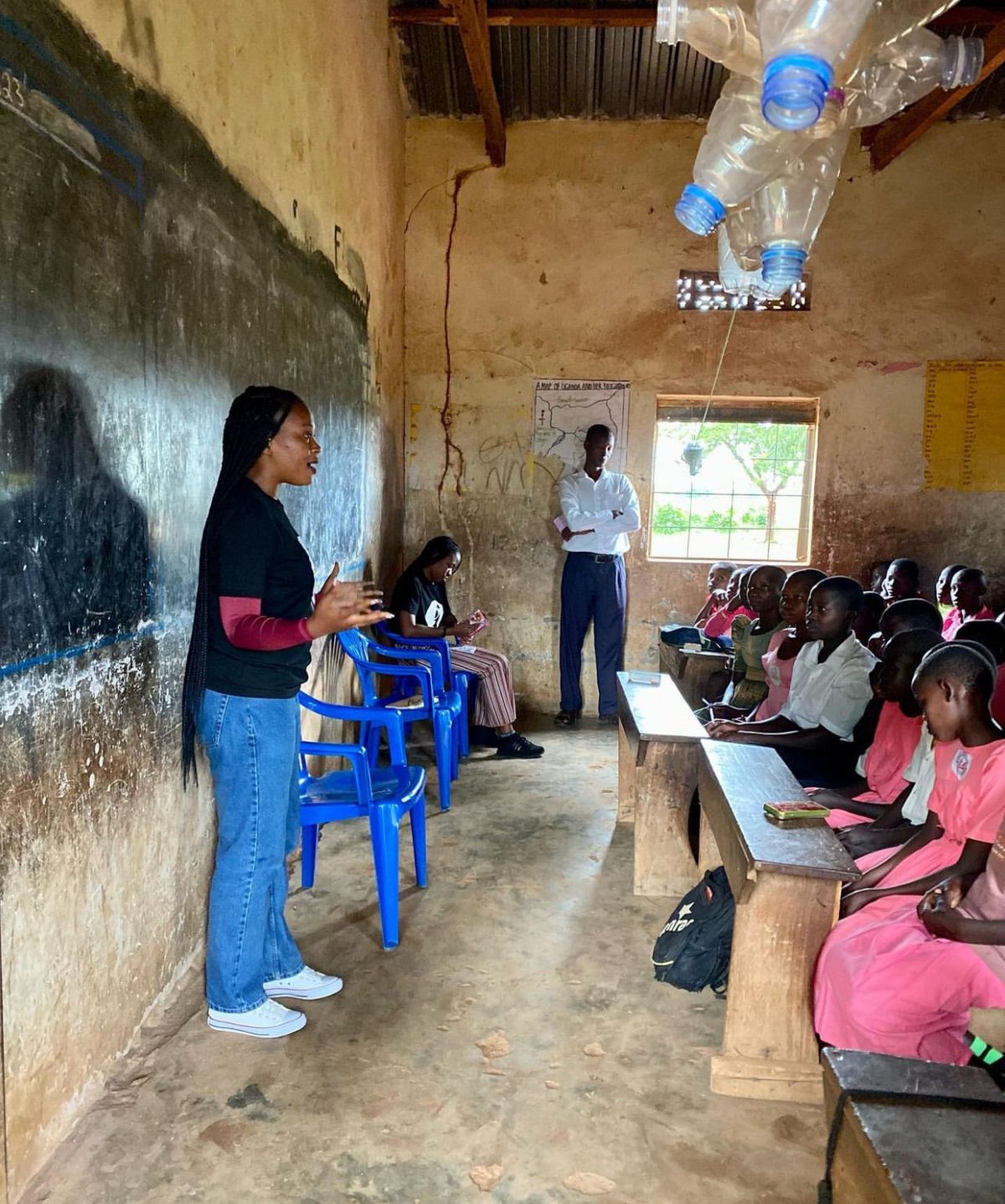 The Gufasha Girls Foundation works to educate girls about family planning. Credit: Joan Kembabazi
The Gufasha Girls Foundation works to educate girls about family planning. Credit: Joan Kembabazi
“That is just one of many devastating stories of how climate change affects young girls worldwide. Had the drought not hit her village, Moureen could have stayed at school and her life could have been different,” says Joan Kembabazi, Moureen’s best friend and founder of Gufasha Girls Foundation, a community-based nonprofit that advocates against child marriage and promotes girls’ education.
In Uganda, young girls and women face multiple challenges. Not only are they disproportionately affected by climate change but they also have limited access to modern contraceptive methods and have no comprehensive sexual and reproductive health education at schools (it was banned by the Parliament in 2016), which makes them even more vulnerable.
Kembabazi sees family planning as an essential tool for climate resilience. That’s why she’s committed to empowering girls and women with education and contraception. “I myself come from a big family and I know how hard it is for my father to provide for his 24 kids,” says the young Ugandan feminist activist. “If he had two or three, it would be much easier.”
Gufasha Girls Foundation is one of many organizations worldwide working to address the ways that poverty, food insecurity, climate change and family planning are linked — and the need to empower girls and women through education and family planning.
Healthy communities, healthy environment
In the Philippines, the PATH Foundation Philippines, Inc. (PFPI) has pioneered an approach that addresses population, health and the environment. When it started in the 1990s as a public health organization raising awareness about the prevention of HIV and AIDS, the foundation worked with young girls who moved to cities to work in the sex industry to support their families at home.
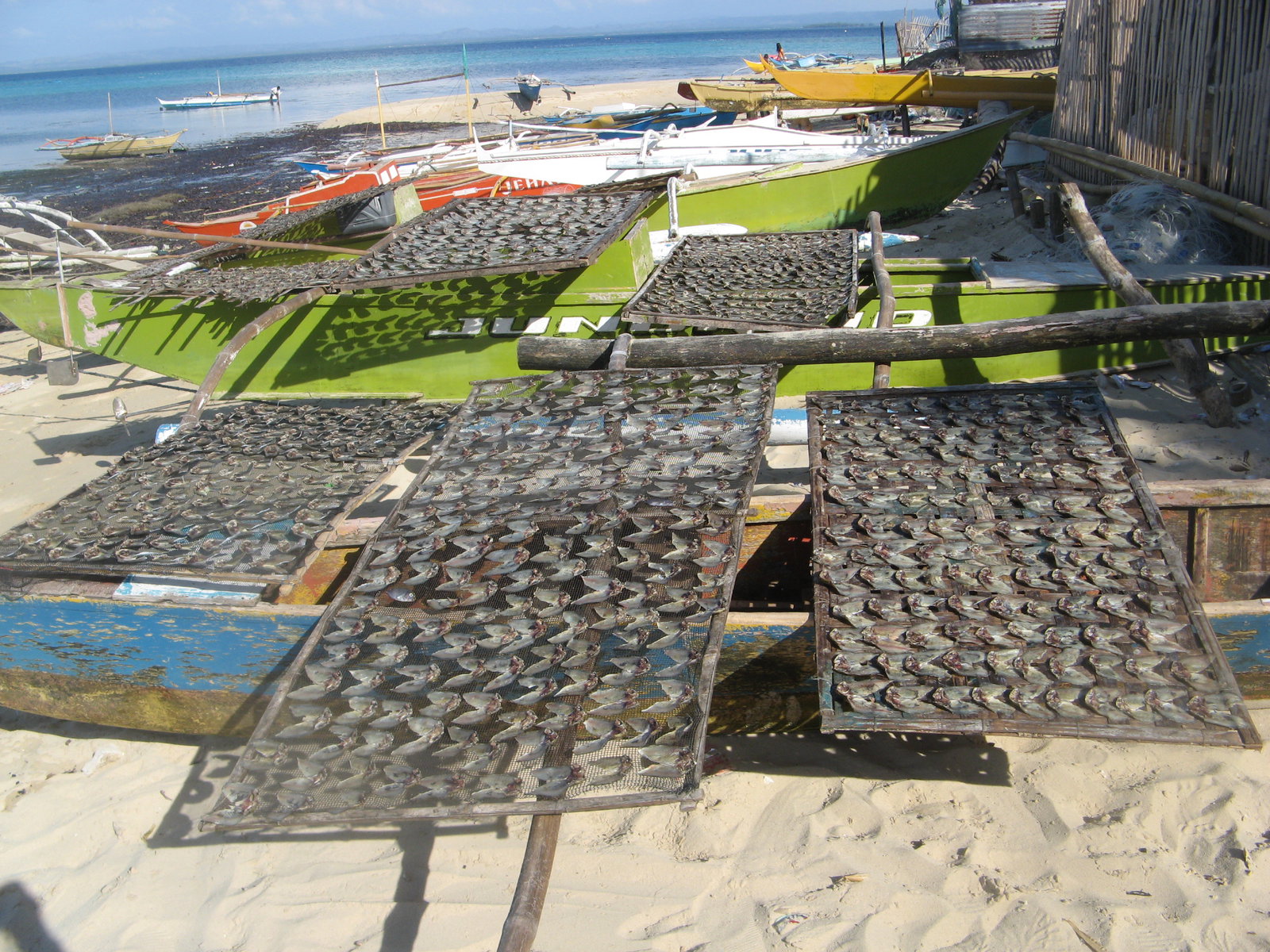 The PATH Foundation Philippines designated areas where fishermen could fish and areas where fishing was prohibited to give the fish stocks time to regenerate. Credit: Ellen Gallares
The PATH Foundation Philippines designated areas where fishermen could fish and areas where fishing was prohibited to give the fish stocks time to regenerate. Credit: Ellen Gallares
PFPI staff understood that if they wanted to help prevent young girls from contracting HIV, they would have to look at the root causes that led them to this line of work. They went to the poor fishing communities where the girls came from (namely the Danajon Bank and Verde Island Passage, which are extremely rich in marine biodiversity) and learned that fishermen there were facing pressure to catch more fish to sustain a growing population.
But since the fish stocks did not have time to regenerate, there were fewer fish every year. This meant that the families had less food and income and were more inclined to send their daughters away to contribute to the budget.
Between 2008 and 2013, PFPI worked with other organizations and the local community to improve the management of 2,000 hectares of marine protected areas. They designated areas where fishermen could fish and areas where fishing was prohibited to give the fish stocks time to regenerate.
Crushed by negative news?
Sign up for the Reasons to be Cheerful newsletter.
[contact-form-7]
Over the course of five years, the fish stocks increased and the food security and economic situation improved. The fishermen also started branching out into other ways to make money, such as selling produce from vegetable gardening, livestock and fowl keeping, running small businesses and tourism.
Besides sustainable management of resources, PFPI also addressed the health needs of the communities. In these isolated rural areas where access to contraceptives was limited to only a few health clinics, it partnered with small convenience stores that started selling condoms and birth control pills in every village.
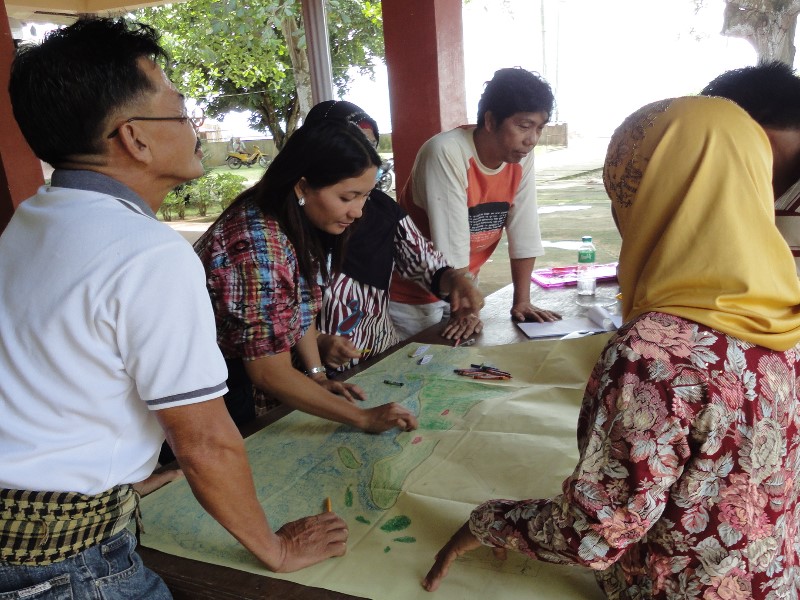 The PATH Foundation Philippines has pioneered an integrated approach that addresses population, health and the environment. Credit: PATH Foundation Philippines
The PATH Foundation Philippines has pioneered an integrated approach that addresses population, health and the environment. Credit: PATH Foundation Philippines
The foundation worked with local leaders — mainly youth, couples, women and fishermen — who then educated their peers about the benefits of family planning, HIV prevention, water and sanitation and malnutrition. Through these peer educators and educational shows on local TV and radio, PFPI was able to reach 1.5 million people. As a result, the rate of contraceptive use among married women of reproductive age increased from 31 percent to 45 percent.
Following its success in the Philippines, PFPI has been advocating for this integrated approach to address climate change, food insecurity and public health in other places in need around the world.
A lack of recognition
On the local level, this approach has been replicated in many parts of the world, including in Venezuela, Colombia, Madagascar, Uganda and Nepal). But on the national level, securing climate and gender justice is not always high on policy makers’ priorities.
At last year’s COP28 in Dubai, representation of women was staggeringly low: only 15 out of 133 world leaders present were women. “When it comes to decision-making power, you can’t make decisions that have the whole world in mind when half the population is not represented in the room,” says climate and community development expert Carissa Patrone Maikuri.
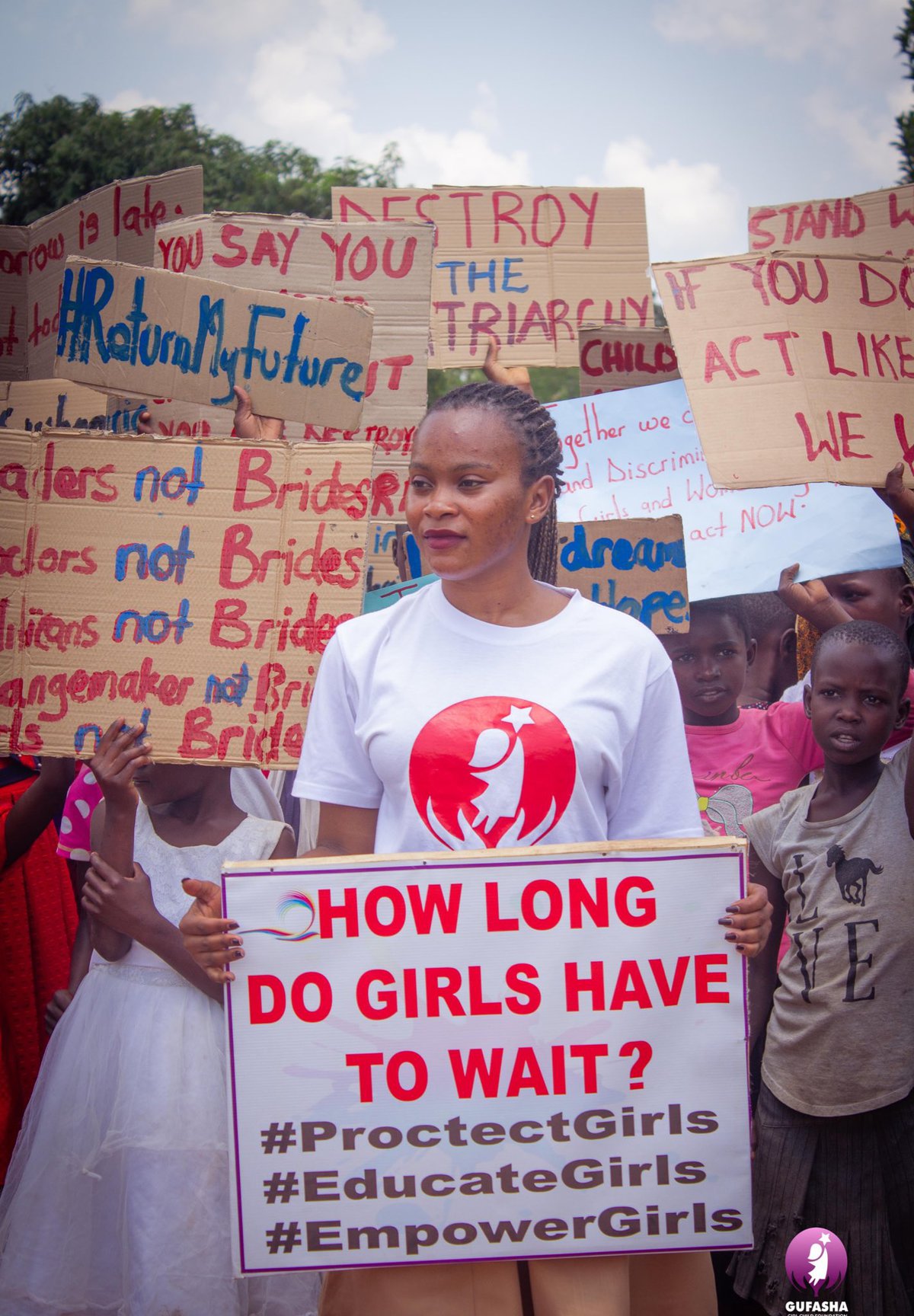 Young girls and women in Uganda have limited access to modern contraceptive methods and no comprehensive sexual and reproductive health education at schools. Credit: Joan Kembabazi
Young girls and women in Uganda have limited access to modern contraceptive methods and no comprehensive sexual and reproductive health education at schools. Credit: Joan Kembabazi
According to the Feminist Climate Justice report, by 2050, up to 158 million more girls and women might be pushed into poverty due to climate change. And yet, many countries’ adaptation plans still don’t mention sexual and reproductive health and rights or universal education as essential human rights or as important adaptation strategies.
Presently, more than 218 million women in low- and middle-income countries want to avoid pregnancy but are not using a modern method of contraception. Globally, nearly half of all pregnancies are unintended.
Turning the tide
It makes sense that, when women are able to choose whether, when, with whom, or how many children to have, they can further pursue their education, tend to have better access to work opportunities, and can improve their own health and that of their families. But the connection to climate change can be harder for people to make.
Patrone Maikuri is among those working to spread the message that family planning can boost women’s resilience to environmental and climatic shocks and stressors. “Many climate folks don’t understand how sexual and reproductive health and rights [are] connected to climate resilience, and as a result, they shy away from the conversation,” she says. “But in the past few years, there has been a small movement that is looking at climate action in a more holistic and intersectional way.”


Become a sustaining member today!
Join the Reasons to be Cheerful community by supporting our nonprofit publication and giving what you can.
A growing number of international organizations have been advocating for gender equality and women’s and girls’ reproductive rights to be embedded into climate solutions and climate justice. For example, the Intergovernmental Panel on Climate Change highlighted voluntary and rights-based family planning as a climate adaptation strategy in its 2014 assessment report. And in 2023, the UN Women called for a new feminist climate justice approach.
The tide is turning, according to Carina Hirsch, head of advocacy and policy at the nonprofit Margaret Pyke Trust. She points to the growing alliance of health-focused organizations that are advocating at a national level with both climate and conservation sectors as well as growing interest from donors to fund this kind of work.
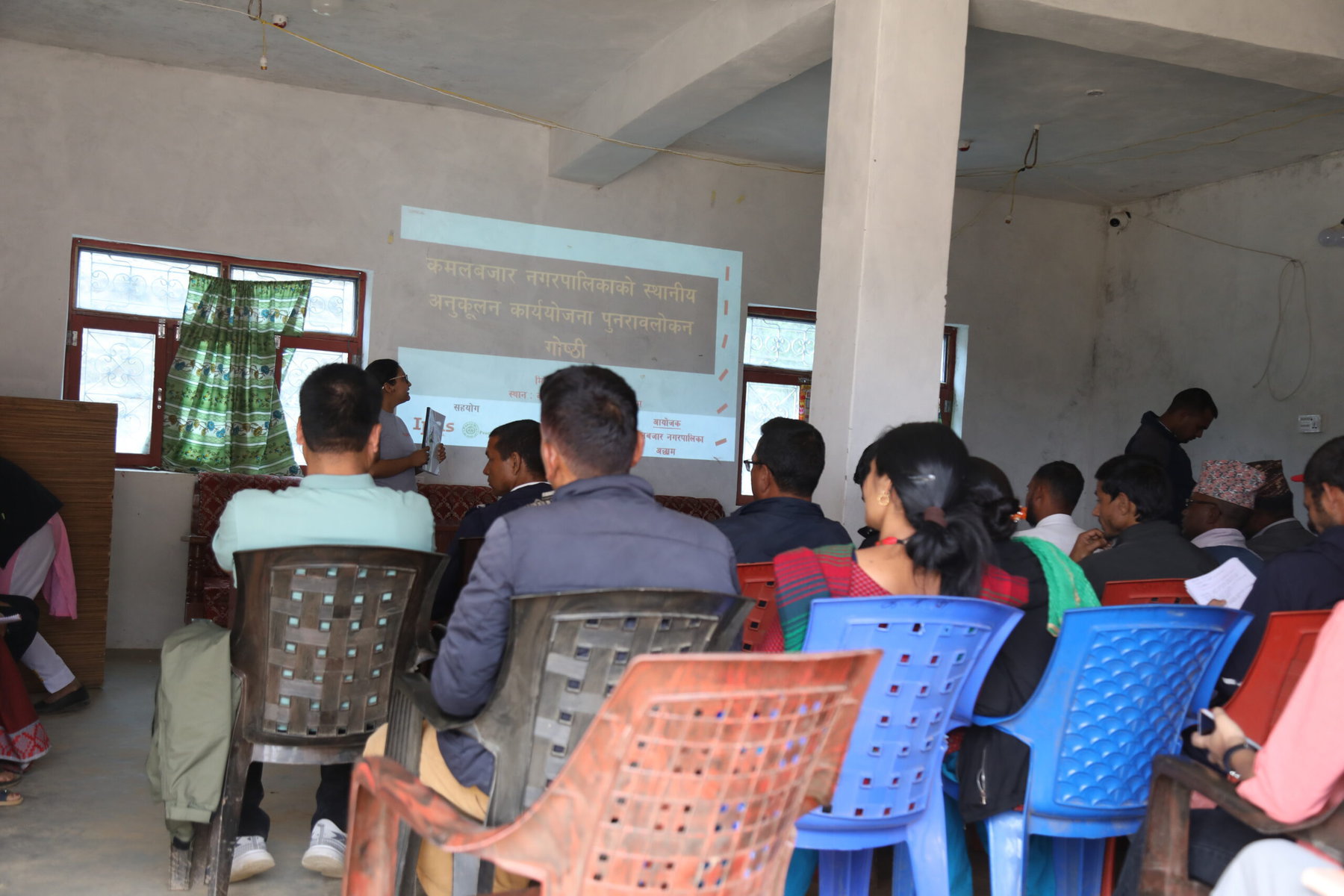 A Local Adaptation Plan of action review workshop in Nepal. Credit: Ipas Nepal
A Local Adaptation Plan of action review workshop in Nepal. Credit: Ipas Nepal
For her, one of the most exciting recent developments was the announcement at COP28 that the UK will provide £16 million in funding focused on the importance of reproductive choice as part of climate resilience building.
Khusbu Poudel, the program coordinator at reproductive rights nonprofit Ipas Nepal, sees this as a welcome change. Nepal is one of the most climate vulnerable countries in the world, and Ipas Nepal helped local governments prepare Local Adaptation Plans for Action, which integrate gender, climate and sexual and reproductive health and rights. “Investing in women, children and adolescents is one of the most impactful climate actions a country can make,” says Poudel, who participated at COP28.
The urgency, Hirsch notes, is clear: “We cannot wait. Climate change is coming no matter what and we know it,” she says. “The least we can do is to make people, particularly women and girls in remote rural communities, that are being hit hardest by climate change, more resilient.”
The post What Does Reproductive Health Have to Do With Climate Vulnerability? appeared first on Reasons to be Cheerful.
Moving to a sustainable system of food production within a degrowth paradigm
I read an interesting report in the last few days – The Economics of the Food System Transformation – published on January 29, 2024 by the – Food Systems Economics Commission (FSEC) – which “is a joint initiative that brings together 21 commissioners from 19 global institutions”. The topic is very relevant to research I…
Caroline Lucas to Demand Ban on MPs Working for Fossil Fuel Giants as Polluters Spend Millions Shaping UK Politics
The UK’s only Green MP will challenge the “cosy links” between the fossil fuel industry, politicians and think tanks in a Commons debate today (30 January).
Brighton Pavilion MP Caroline Lucas, who is stepping down from Parliament at the next election to make more time for politics, told Byline Times: “When we face a climate emergency, it is outrageous that the fossil fuel industry continues to enjoy cosy links with politicians, exercising a malign influence on policy-making to the benefit of oil & gas companies while our planet boils.”
She added: “Donations, sponsorship and the buying-up of former ministers needs to end now. It’s way past the time for Westminster to end polluters’ access to the heart of policy-making.”
It comes amid growing scrutiny of the role fossil-fuel funded think tanks have on Britain’s political debate – and as Labour appears set to drop its pioneering commitment to invest £28bn a year on green infrastructure.
In her debate, Caroline Lucas will highlight the disconnect between the need to leave the majority of the world’s coal, gas, and oil reserves underground to prevent climate breakdown – and the UK Government continuing "business as usual" or worse in its approach to climate change.
PM Rishi Sunak’s Government is currently pushing through legislation to push for new oil and gas licences to be granted to energy firms every year in the North Sea. Sunak has also rowed back on a number of green commitments including the phase out of gas boilers and the ban on new petrol/diesel car sales, and passed legislation intended to target climate protesters such as the Public Order Act 2023.
Last year, climate publication DeSmog found that firms and donors linked to climate denial groups, high-polluting sectors and fossil fuels interests gave more than £3.5 million to the Conservative Party in 2022.
Electoral Commission records revealed that the party and its MPs received “considerable sums from the highly polluting aviation and construction industries, mining and oil interests, and individuals linked to the Global Warming Policy Foundation, a think tank that denies climate science,” the outlet reported.
Three of the biggest donors to the Conservative party are funders or board members of the climate science sceptic think tank, the Global Warming Policy Foundation, or its spin off Net Zero Watch, she will say.
Journalist Peter Geoghegan has also unearthed US tax documents showing that the Tufton Street-clique of right-wing think tanks received more than $1m from US donors in a single year, 2021, including significant sums from fossil fuel interests, a major Tory donor, and an influential Soviet-born billionaire.
Lobbying Links
Caroline Lucas identifies the influence of the fossil fuel industry in politics as a key reason for government inaction on climate issues.
She’ll point to Gulf states pushing fossil fuels at the recent United Nations COP 28 conference, with ex-chancellor Philip Hammond, ex-PM Tony Blair, and ex-minister Francis Maude paid as ‘consultants’ for lobbyists and polluters.
Companies ranging from Cardiff Airport to ExxonMobil are also known for handing out football tickets and passes for hospitality events to MPs across the political spectrum.
Lucas points out that former politicians and ministers often take up consultancy roles in the oil and gas sector, highlighting the "revolving doors" between parliamentarians and polluting industries.
And she notes that many of the major donors to the Conservative party are linked to climate science “sceptical” groups like the Global Warming Policy Foundation and Net Zero Watch.
Serving Conservative MPs including Mark Pritchard and Sir John Hayes work for, respectively, Linden Energy Holdings, a US fossil fuel firm, and fossil fuel logistics firm BB Energy Trading Ltd. The Guardian previously reported that Linden Energy Holdings had been accused of using “classic climate denial tactics to delay action on the climate crisis.”
Turning off the Tap
Lucas will also criticise the practice of oil and gas firms lavishing MPs with gifts – lobbying to delay, control or block policies to tackle climate change.
The Green MP is calling for an overhaul of current lobbying rules, noting that most lobbying activities do not breach parliamentary rules but still pose major ethical concerns.
She proposes a "firewall" between the fossil fuel industry and decision-making, including public disclosure of conversations between policymakers and industry representatives.
Lucas is also demanding a complete ban on any sitting parliamentarians doing consultancy work for fossil fuel interests, and an end to fossil fuel company sponsorship of political party conferences.
The former Green Party leader suggests banning fossil fuel industry involvement in climate negotiations, prohibiting staff swaps between the industry and government, and implementing stricter rules on post-parliamentary employment in the industry.
Last July, Labour left-winger Richard Burgon proposed a new law to prevent MPs from taking any second jobs with, or receiving donations, gifts, hospitality or benefits-in-kind from any company that makes more than 50% of its annual revenue from oil or gas. Needless to say, it was not endorsed by the Government.
Polluting firms and lobbyists are also known to run and fund All Party Political Groups in Parliament, which bring together MPs and peers to propose policy and shape political debate.
Polling released in November found that voters believe Britain’s think tanks – the policy-writing research houses that often have charitable status – are opaque and need to open up about their funding.
A majority (59%) of the British public believe think tanks are not transparent, with only 19% of respondents disagreeing, Deltapoll polling for the Centre and Millbank Think Tanks found.
A majority of people believed think tanks lack transparency in every area of the UK included in the poll. That went for people of all ages, political leanings, voting intentions and social classes, with clear majorities for reform whichever side of the Brexit debate voters fall.
Do you have a story that needs highlighting? Get in touch by emailing josiah@bylinetimes.com
A Theory of Everyone: Who We Are, How We Got Here, and Where We’re Going – review
In A Theory of Everyone: Who We Are, How We Got Here, and Where We’re Going, Michael Muthukrishna contends that the core issue affecting Western societies is increasing energy scarcity, leading to economic struggles, political disillusionment, and global instability. Though the public policy solutions Muthukrishna proposes – like better immigration systems and start-up cities – are outlined only vaguely, the book offers fresh ideas in an engaging writing style, according to James Sewry.
A Theory of Everyone: Who We Are, How We Got Here, and Where We’re Going. Michael Muthukrishna. Basic Books. London. 2023.
 A Theory of Everyone by Michael Muthukrishna, Associate Professor of Economic Psychology at LSE, is a bold and ambitious book. It argues that the underlying cause of the present malaise of western societies is increasing energy scarcity. There is no doubt that the malaise is real. Since the global financial crisis, the UK has struggled to achieve economic and productivity growth; living standards are stagnant; inflation recently reached almost double figures; and the cost of energy spiked. As faith in politics and institutions is eroded, voters are drawn towards populism. Social media polarises us. The global order seems precarious: wars rage in Ukraine and the Middle East. In the words of Muthukrishna, “we can feel in our bones that the world is breaking – that something is wrong”.
A Theory of Everyone by Michael Muthukrishna, Associate Professor of Economic Psychology at LSE, is a bold and ambitious book. It argues that the underlying cause of the present malaise of western societies is increasing energy scarcity. There is no doubt that the malaise is real. Since the global financial crisis, the UK has struggled to achieve economic and productivity growth; living standards are stagnant; inflation recently reached almost double figures; and the cost of energy spiked. As faith in politics and institutions is eroded, voters are drawn towards populism. Social media polarises us. The global order seems precarious: wars rage in Ukraine and the Middle East. In the words of Muthukrishna, “we can feel in our bones that the world is breaking – that something is wrong”.
The global order seems precarious: wars rage in Ukraine and the Middle East. In the words of Muthukrishna, ‘we can feel in our bones that the world is breaking – that something is wrong’.
The ultimate cause of all these different problems, Muthukrishna argues, is the lack of excess energy. Tapping into the energy contained within fossil fuels has driven society’s development since the Industrial Revolution, precipitating prosperity and increasing standards of living. Until relatively recently, energy seemed abundant. But fossil fuels are running out. The energy return on investment (EROI) that they offer is diminishing. For every single barrel of oil discovered in 1999 one could find at least another 1,000, but by 2010, this number had reduced to five. As Muthukrishna contends, we came to take energy for granted and stopped thinking about it. But as it becomes more expensive and more effort is spent on its extraction, life becomes harder. This matters because, as the availability of excess energy reduces, the “space of the possible”, that is, what humans are collectively able to achieve, shrinks with it. Humanity’s pressing challenge, therefore, is how to arrive at the “next level of abundance that leads to a better life for everyone”. Otherwise, according to Muthukrishna, the future will be bleak, with humanity beset by conflict over dwindling energy and resources.
Tapping into the energy contained within fossil fuels has driven society’s development since the Industrial Revolution, precipitating prosperity and increasing standards of living. Until relatively recently, energy seemed abundant.
To provide an approach to this enormously challenging future, A Theory of Everyone is divided into two parts. The first explains “who we are” and “how we got here”, detailing what the author proposes as the four “laws of life” which underpin human development: energy, innovation, cooperation and evolution. This layout is justified on the grounds that “the forces that shape our thinking, our economies, and our societies have become invisible to us”, and that in order to solve problems, we must first understand them. Part two then considers practical policy solutions that might begin to address our current predicament: “how this comprehensive theory of everyone can lead to practical policy applications.”
What distinguishes us is our capacity for social learning and imitation which has enabled each generation of humans to add to the stock of knowledge which is then acquired and marginally improved upon by each subsequent generation.
Given the scale and ambition of the book, it is perhaps unsurprising that the reader is left feeling disappointed by its suggestions for public policy. Muthukrishna essentially offers the following ideas: better designed immigration, educational and tax systems; start-up cities; programmable politics; the curation of free speech and genuine meritocracy; and improving the internet and social media. Taken by themselves, many of these ideas are sound, and if there were sufficient political will, ought to be implemented as soon as practically possible. There are also many powerful insights within the book that might help shift some common understandings, such as the assumption, which Muthukrishna powerfully counters, that what differentiates us as a species is our innate intelligence and ability to reason. Instead, what distinguishes us is our capacity for social learning and imitation which has enabled each generation of humans to add to the stock of knowledge which is then acquired and marginally improved upon by each subsequent generation. Our intelligence is therefore more the result of this evolving cultural “download” than it is thanks to raw ability.
It is difficult to see how the book’s policy ideas sufficiently match the scale of the challenges the author outlines.
However, some of these practical applications are frustratingly light on detail. For example, his proposals for “start-up cities” and “programme politics” in his chapter on governance in the twenty-first century are both sketched out only vaguely, with little sense of how they might be realised. Where ideas are fleshed out, they are sometimes caveated with qualifiers such as “this approach is one of many and may not even be the best approach”. On occasion the author struggles to move beyond platitudes, as in his very brief discussion of artificial intelligence: “More progress is needed to know the true limits of what machines can achieve and our role in all of this. The tides of progress can only be held back for so long.” It is difficult to see how the book’s policy ideas sufficiently match the scale of the challenges the author outlines.
Muthukrishna does not seem to appreciate, or at least makes no room for, the fact that a number of his fundamental assumptions, such as a belief in the underlying virtue of capitalism and economic growth, might not be universally shared. Others would want to see climate change given more thorough treatment.
These flaws do not mean that the book is without merit. A recognition of the world’s complexity and the author’s commitment to truth and the scientific method means he is robustly unafraid to court controversy. He lauds unfettered free speech, expresses scepticism towards affirmative action, and explores sex-based differences in intelligence, while on immigration he contends that new migrants bring “with them cultural values both desirable and less desirable”. Muthukrishna is arguably right not to shy away from these controversial areas for, as he argues, “we can only arrive at the truth in a diverse environment of different backgrounds, considering all hypotheses and ideas – both those we like and those we don’t.”
Muthukrishna is arguably right not to shy away from […] controversial areas for, as he argues, ‘we can only arrive at the truth in a diverse environment of different backgrounds, considering all hypotheses and ideas’
The book is also written in an engaging and accessible manner, and whilst it might fail to attain the heights it purports to reach, in its fresh thinking it is a welcome addition to the basket of literature that helps contemporary politicians, policymakers, and anyone with an interest in the direction of humanity grapple with the complexity of today’s challenges.
This post gives the views of the author, and not the position of the LSE Review of Books blog, or of the London School of Economics and Political Science. The LSE RB blog may receive a small commission if you choose to make a purchase through the above Amazon affiliate link. This is entirely independent of the coverage of the book on LSE Review of Books.
Image Credit: blvdone on Shutterstock.
Anything we can actually do, we can afford
I often make the point in talks that the fictional world that mainstream economists promote leads to poor decisions in the real world by our policy makers. We saw that in the 1980s and 1990s with the large scale privatisations of public enterprises, touted as employment-enriching, productivity-boosting strategies to provide ‘more money for government to…
A Ranch, Rewilded: The Transformation of California’s Next State Park
On a bright morning in early January near the confluence of the San Joaquin and Tuolumne rivers in Central California, John Cain looks out over a small, curved lake. The trees are mostly bare for winter, but Cain, senior director of conservation of the nonprofit organization River Partners, points out that the wild landscape in front of him is buzzing. Bright white egrets swoop lazily down into the water while terns whiz by in the air. A California rose bush clings onto bright red rose hips. The low-lying plain across the water is dense with gray branches of adolescent trees.
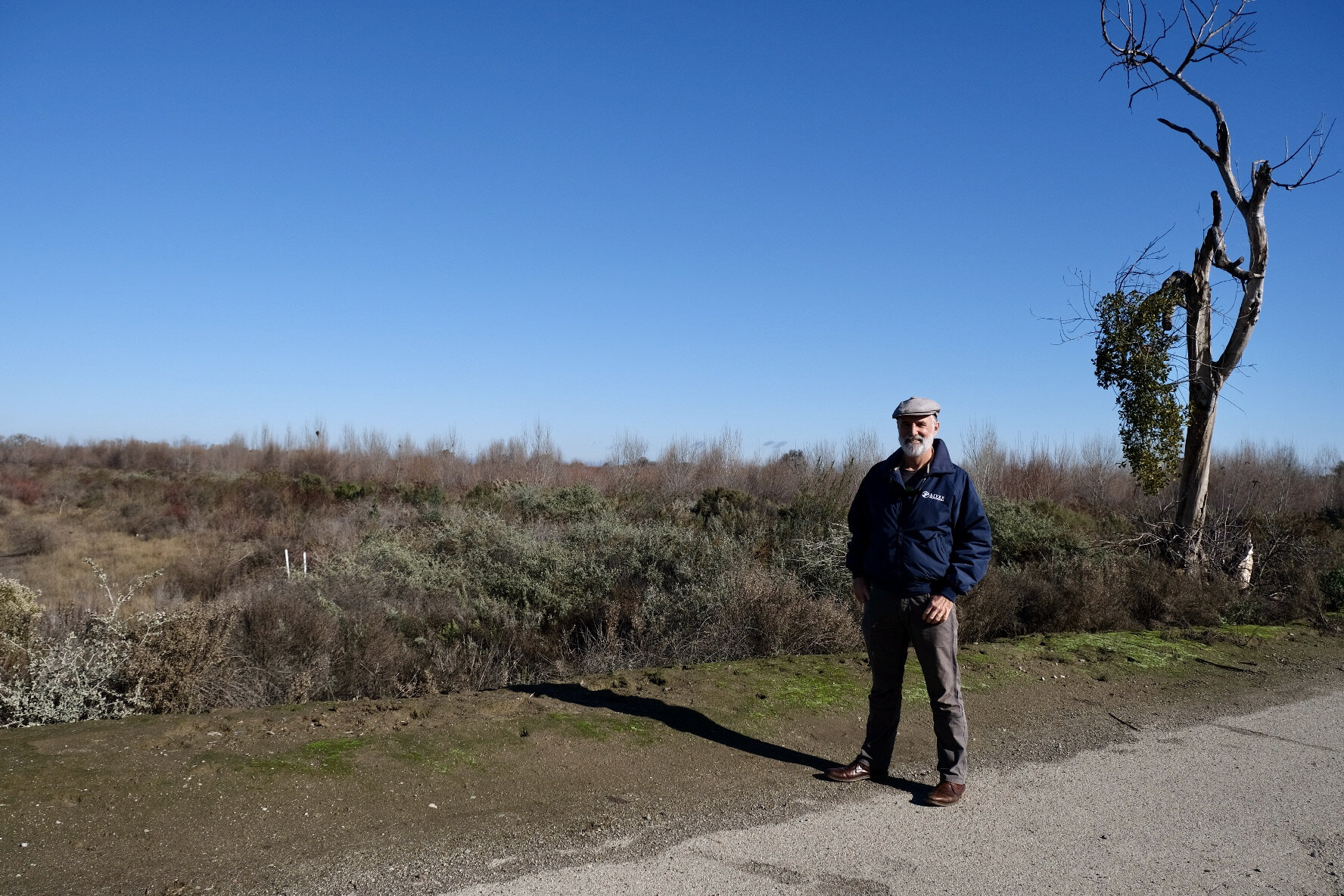 John Cain of River Partners. Credit: Elizabeth Hewitt
John Cain of River Partners. Credit: Elizabeth Hewitt
For more than four months last year, as California was inundated with a series of major storms, this part of Dos Rios Ranch Preserve, about 20 miles west of Modesto, was submerged under water. That’s exactly what it was designed for. And when the floodwaters recede, Cain says, “It’s just an explosion of life out here.”
Until a little more than a decade ago, this area was productive farmland, used for growing crops like tomatoes, alfalfa, melons and almonds. Now it’s set to be California’s next state park after a restoration project spearheaded by River Partners converted the ranch into rewilded riverside habitat. As climate change has doubled the likelihood of flooding in California, and is projected to increase runoff from storms by as much as 200 to 400 percent, this restored floodplain is proving to be a promising approach.
The post A Ranch, Rewilded: The Transformation of California’s Next State Park appeared first on Reasons to be Cheerful.